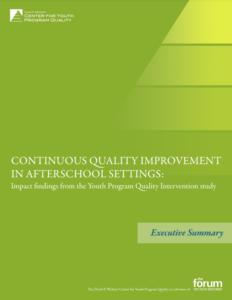Abstract
Background: Out-of-school time programs can have positive effects on young people’s development; however, programs do not always produce such effects. The quality of instructional practices is logically a key factor but quality improvement interventions must be understood within a multi-level framework including policy, organization, and point of service if they are to be both effective and scalable.
Purpose: To evaluate the effectiveness of the Youth Program Quality Intervention (YPQI), a data-driven continuous improvement model for afterschool systems. Research questions include:
- Does the YPQI increase managers’ focus on instruction and the use of continuous improvement practices by site-based teams?
- Does the YPQI improve the quality of afterschool instruction?
- Does the YPQI increase staff tenure?
- Can the YPQI be taken to scale across programs that vary widely in terms of structure, purposes, and funding and using resources available to public agencies and community-based organizations?
- Will afterschool organizations implement the YPQI under lower stakes conditions where compliance with the model is focused on the improvement process rather than attainment of pre-determined quality ratings?
Participants: Eighty-seven afterschool sites in five diverse afterschool networks participated in the study. Each site employed the equivalent of one full-time program manager and between two and ten direct staff; had an average annual enrollment of 216 youth; and had an average daily attendance of 87 youth.
Research Design: This is a cluster randomized trial. Within each of the five networks, between 17 and 21 sites were randomly assigned to an intervention (N=43) or control group (N=44). Survey data were collected from managers, staff, and youth in all sites at baseline prior to randomization (spring 2006), at the end of the implementation year of the study (spring 2007) and again at the end of the follow-up year (spring 2008). External observers rated instructional practices at baseline and at the end of the implementation year. Implementation data were collected from both intervention and control groups. Hierarchical linear models were used to produce impact estimates.
Findings: The impacts of the YPQI on the central outcome variables were positive and statistically significant. The YPQI produced gains in continuous improvement practices with effect sizes of .98 for managers and .52 for staff. The YPQI improved the quality of staff instructional practices, with an effect size of .55. Higher implementation of continuous improvement practices was associated with higher levels of instructional quality, with effects nearly three times greater than the overall experimental impact. Level of implementation was sustained in intervention group sites in the follow-up year.
Conclusions: This study demonstrates that a sequence of continuous improvement practices implemented by a site-based team – standardized assessment of instruction, planning for improvement, coaching from a site manager, and training for specific instructional methods – improves the quality of instruction available to children and youth. The YPQI produces a cascade of positive effects beginning with the provision of standards, training, and technical assistance, flowing through managers and staff implementation of continuous improvement practices, and resulting in effects on staff instructional practices. Evidence also suggests that participation in the YPQI may increase the length of staff tenure and that YPQI impacts are both sustainable and scalable.
Smith, C., Akiva, T., Sugar, S., Lo, Y. J., Frank, K. A., Peck, S. C., Cortina, K. S., & Devaney, T. (2012). Continuous quality improvement in afterschool settings: Impact findings from the Youth Program Quality Intervention study. Washington, DC: The Forum for Youth Investment.
